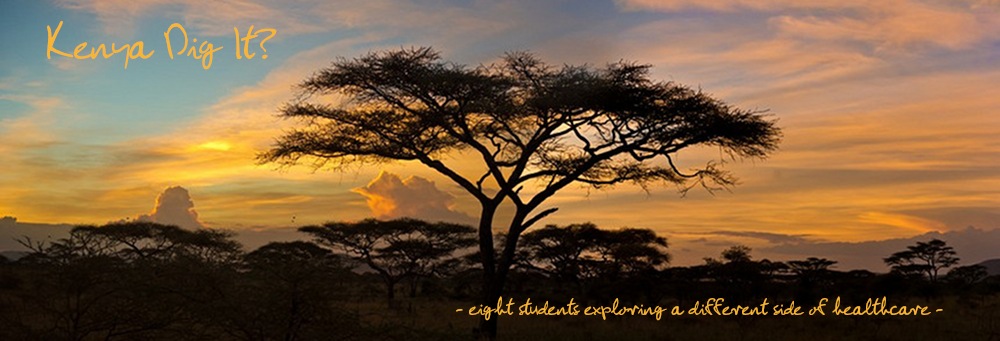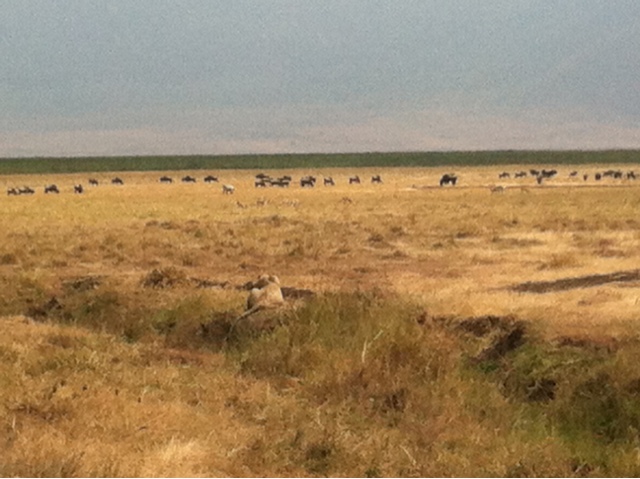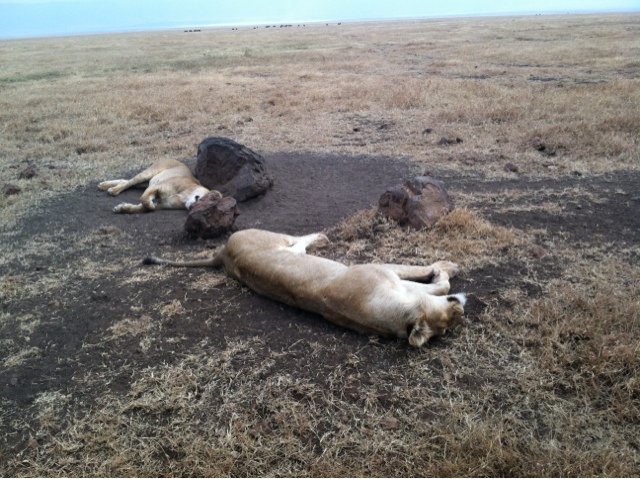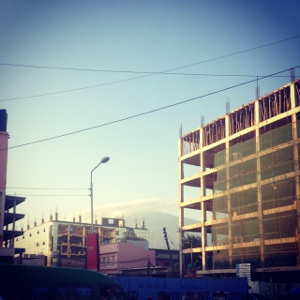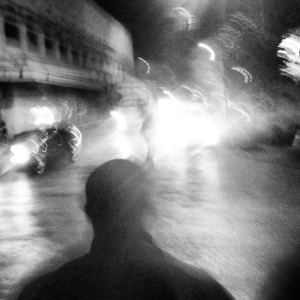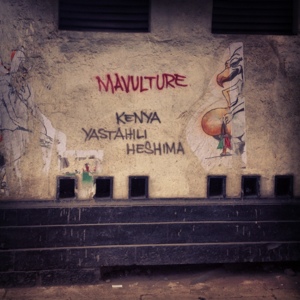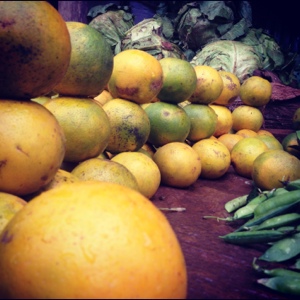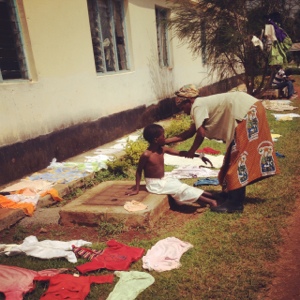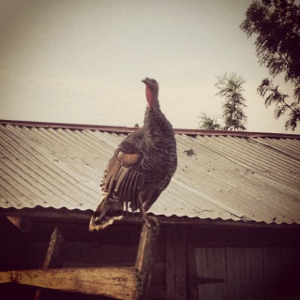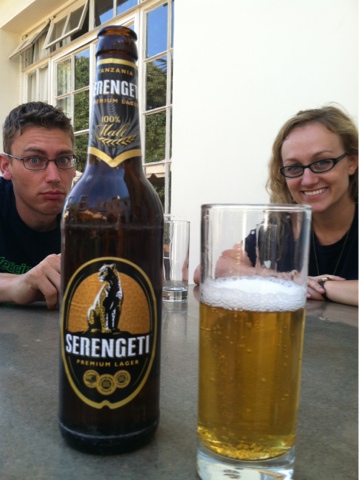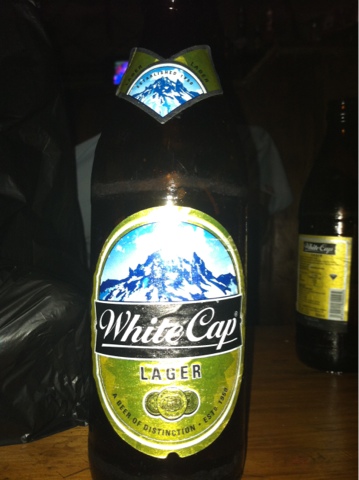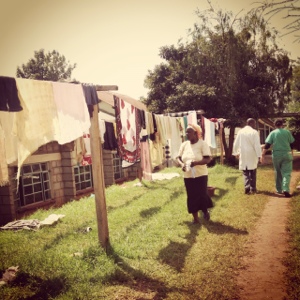Left Dar Es Salaam early this morning and now we are safely arrived in Cairo for a 20 hour layover. We have a birthday boy with us who will be checkin out some sweet pyramids for his last year in his 3rd decade.
Back in the states by 1600 EST tomorrow!
Monday, July 30, 2012
Saturday, July 28, 2012
Finishing Zanzibar and future considerations
Our time in Zanzibar is nearly over, but having 'made the most' of our stay, it's not a sad farewell at all. The 6 of us are now open water certified for scuba diving, we saw amazing reefs and scores of fish, and we've eaten some incredible seafood, on top of mucho-relaxing before we head back.
As time and Internet constraints have hampered our ability to update the blog, I wanted to say this: I have numerous photos I'd like to share and more stories of my experience in Africa, the hospital, and life over the last six weeks in general. So, kindly check back over the coming weeks/months if you're interested in reading more.
We head to Dar Es Salaam tomorrow, then it's a quick stopover in Egypt before we head back on the 31st. We should arrive the same day around 3pm. Looking forward to seeing y'all state-side.
Sam
As time and Internet constraints have hampered our ability to update the blog, I wanted to say this: I have numerous photos I'd like to share and more stories of my experience in Africa, the hospital, and life over the last six weeks in general. So, kindly check back over the coming weeks/months if you're interested in reading more.
We head to Dar Es Salaam tomorrow, then it's a quick stopover in Egypt before we head back on the 31st. We should arrive the same day around 3pm. Looking forward to seeing y'all state-side.
Sam
Friday, July 20, 2012
Stayin alive
If you've not figured it out yet from the last post, all of us are still alive and well. We were not passengers on that ferry from Dar to Zanzibar that met with disaster. Hope that puts those of you who were worried at ease.
Thursday, July 19, 2012
Ngorongoro Crater Safari
You know how back home in most rural areas you have to watch out for raccoons and deer on the roads? Well, here in Tanzania, you have to watch out for cows and goats being herded across the roadways, as well as jackals and the occasional giraffe. Yes, we passed one of those yesterday while traveling between the crater and Arusha.
Ngorongoro crater is touted as the eighth wonder of the world, and rightly so. Yesterday we got to drive right up to hippos and zebras and wildebeest, just to name a few. Here are a few photos of some of the things we got to see.
Ngorongoro crater is touted as the eighth wonder of the world, and rightly so. Yesterday we got to drive right up to hippos and zebras and wildebeest, just to name a few. Here are a few photos of some of the things we got to see.
Tuesday, July 17, 2012
Hooray!
Our four weeks of work at Kitale District Hospital have come to an end. Time for a holiday! Reek, this post is for you.
A few beers from east Africa:
A few beers from east Africa:
Wednesday, July 11, 2012
Letter to my future-doctor self
Dear Self,
It is not enough that you came to this place. Your knowledge was insufficient, your education far from complete; in fact, your contribution to these people, to that hospital was well short of minimal. Rest not on your laurels, for they aren't achievements after all. Your travels mean little to these patients, insofar as altering the trajectory of their lives. As my colleague put it, you've experienced the best that medical tourism has to offer.
That said, me (you) being the swell individual that I (you) am (are) [this addressing of one's self is a grammatical nightmare...apologies], I'll give you an opportunity to repay your debt. All I ask is that you take lessons learned from the best and worst you've experienced here, and apply them in your practice, indeed, your life.
Care for your patients
I'm not talking about dressing wounds, or dosing pain meds: these are standards of care to which we all must adhere. Indeed, you can and should go further.
Clean your patients following a procedure, for it signifies devotion to de-tail, and restores some dignity to the flesh you just probed, incised, violated in your quest for diagnosis or cure. Learn their names and use them, as it's the easiest compliment to pay someone. Take pride in your work: your lazy suturing is a lifelong scar for them. Treat them as though they were your own and you'll never truly fail them.
Don't just rely on lab tests
Join that great fraternity of time-honored healers and actually pay attention to your patient's signs and symptoms. Look at them, touch them, smell them. The human body, even its clothed state can scream clues to you. Much like that bilateral eyelid droop you carelessly overlooked in that six-year old.
Research your patients' illnesses
You didn't have your textbooks, you said, or you would have known what that HIV fusion inhibitor drug was. Bollocks. You had plenty of time in the internet cafe the day before to research HIV and its treatment. It's Africa, for crying out-loud, you knew you were going to see HIV patients. Don't get caught with your pants down again, lest I disown you.
Research your patients
Note the difference between this and the former point. Your patients are the product of a very specific lineage. Their father's father is responsible for that broad, flat nose, and their mother's sister contributed their skill at quilting. We all, in fact, are merely a collection of those persons and things that came before us. Our attitudes, beliefs, values, and morals have been forged sharply in the fires of family culture, shaped bluntly by the regions from which we come. Come to know these and you'll come to know your patients. Other ignorant, unmindful physicians will be prohibited from gaining this, your unprecedented access to the patient. It simply will allow you to heal more thoroughly.
Use the mothers
If you end up in pediatrics, use the mothers. No amount of schooling or experience will tell you more than a mother's intuition. Now that you're ready to argue this point (after some thoughtful consideration, of course), go back and read it again. I'm sure your mother would concur, and you've not made it a habit of challenging her in the past, so why start now?
Take time for you
This is a taxing profession, filled with seemingly endless hours of frustration. It will call for a level of diligence and concentration that seems beyond human capabilities at times. You will take this all in stride, however. If you fall off the horse (this will happen), you will stand up, brush off your backside, and mutter to yourself, again. You will be surrounded by a horde of whitecoat-clad colleagues with a similar mindset. Do yourself a favor and make friends outside this profession. They will keep you grounded, providing a sense of normalcy otherwise stolen by your career. And, for God's sake, take some time for yourself. Read a book, cook an elaborate dinner, nap, write more letters to your future self...frankly, I don't give a damn what you do, just do something other than this work. It is not all that you are, and besides, an investment of time into yourself will only allow you to be better at your job when you return to it.
Lay hands on your patients
Nothing reaffirms more the shared human connection between individuals than that of touch. Take a pulse if you have to; at least they'll know you have one, too.
Learn all you can
Medicine or otherwise. No matter how smart you think you are, you aren't, really. You won't be able to collect books as fast as you'll run into people that can run mental circles around you. Ignore your prideful, jealous nature and learn from these people. Keep your eyes open and your ears perked, you never know when you'll encounter a teaching moment, and I'm not talking solely of medicine or the hospital.
Teach, teach, teach
Never forget how you felt when someone took you under their wing and forcefully fed you as much knowledge as you could feasibly stomach. Never forget what it was like to be ignorant, still viewing the world as flat. In this life and in this profession, you have an obligation to pass on knowledge, for none of it is truly original. Don't hoard it, instead hand it out indiscriminately, as though running through town tossing out candies for the children. Abhor pretense and seek the truth. All else is a disservice to the world.
Lead by example
No amount of appeal or protestation will motivate others to work as though you feel they should. Waste not your time in devising clever ways to "out" them or shame them into correcting their (in)action. Pick up the yolk and plow some more. Trust me, it won't go unnoticed by everyone.
It is not enough that you came to this place. Your knowledge was insufficient, your education far from complete; in fact, your contribution to these people, to that hospital was well short of minimal. Rest not on your laurels, for they aren't achievements after all. Your travels mean little to these patients, insofar as altering the trajectory of their lives. As my colleague put it, you've experienced the best that medical tourism has to offer.
That said, me (you) being the swell individual that I (you) am (are) [this addressing of one's self is a grammatical nightmare...apologies], I'll give you an opportunity to repay your debt. All I ask is that you take lessons learned from the best and worst you've experienced here, and apply them in your practice, indeed, your life.
Care for your patients
I'm not talking about dressing wounds, or dosing pain meds: these are standards of care to which we all must adhere. Indeed, you can and should go further.
Clean your patients following a procedure, for it signifies devotion to de-tail, and restores some dignity to the flesh you just probed, incised, violated in your quest for diagnosis or cure. Learn their names and use them, as it's the easiest compliment to pay someone. Take pride in your work: your lazy suturing is a lifelong scar for them. Treat them as though they were your own and you'll never truly fail them.
Don't just rely on lab tests
Join that great fraternity of time-honored healers and actually pay attention to your patient's signs and symptoms. Look at them, touch them, smell them. The human body, even its clothed state can scream clues to you. Much like that bilateral eyelid droop you carelessly overlooked in that six-year old.
Research your patients' illnesses
You didn't have your textbooks, you said, or you would have known what that HIV fusion inhibitor drug was. Bollocks. You had plenty of time in the internet cafe the day before to research HIV and its treatment. It's Africa, for crying out-loud, you knew you were going to see HIV patients. Don't get caught with your pants down again, lest I disown you.
Research your patients
Note the difference between this and the former point. Your patients are the product of a very specific lineage. Their father's father is responsible for that broad, flat nose, and their mother's sister contributed their skill at quilting. We all, in fact, are merely a collection of those persons and things that came before us. Our attitudes, beliefs, values, and morals have been forged sharply in the fires of family culture, shaped bluntly by the regions from which we come. Come to know these and you'll come to know your patients. Other ignorant, unmindful physicians will be prohibited from gaining this, your unprecedented access to the patient. It simply will allow you to heal more thoroughly.
Use the mothers
If you end up in pediatrics, use the mothers. No amount of schooling or experience will tell you more than a mother's intuition. Now that you're ready to argue this point (after some thoughtful consideration, of course), go back and read it again. I'm sure your mother would concur, and you've not made it a habit of challenging her in the past, so why start now?
Take time for you
This is a taxing profession, filled with seemingly endless hours of frustration. It will call for a level of diligence and concentration that seems beyond human capabilities at times. You will take this all in stride, however. If you fall off the horse (this will happen), you will stand up, brush off your backside, and mutter to yourself, again. You will be surrounded by a horde of whitecoat-clad colleagues with a similar mindset. Do yourself a favor and make friends outside this profession. They will keep you grounded, providing a sense of normalcy otherwise stolen by your career. And, for God's sake, take some time for yourself. Read a book, cook an elaborate dinner, nap, write more letters to your future self...frankly, I don't give a damn what you do, just do something other than this work. It is not all that you are, and besides, an investment of time into yourself will only allow you to be better at your job when you return to it.
Lay hands on your patients
Nothing reaffirms more the shared human connection between individuals than that of touch. Take a pulse if you have to; at least they'll know you have one, too.
Learn all you can
Medicine or otherwise. No matter how smart you think you are, you aren't, really. You won't be able to collect books as fast as you'll run into people that can run mental circles around you. Ignore your prideful, jealous nature and learn from these people. Keep your eyes open and your ears perked, you never know when you'll encounter a teaching moment, and I'm not talking solely of medicine or the hospital.
Teach, teach, teach
Never forget how you felt when someone took you under their wing and forcefully fed you as much knowledge as you could feasibly stomach. Never forget what it was like to be ignorant, still viewing the world as flat. In this life and in this profession, you have an obligation to pass on knowledge, for none of it is truly original. Don't hoard it, instead hand it out indiscriminately, as though running through town tossing out candies for the children. Abhor pretense and seek the truth. All else is a disservice to the world.
Lead by example
No amount of appeal or protestation will motivate others to work as though you feel they should. Waste not your time in devising clever ways to "out" them or shame them into correcting their (in)action. Pick up the yolk and plow some more. Trust me, it won't go unnoticed by everyone.
Laughing and Crying and Gaining Perspective
The past few weeks have been exciting, inspiring, trying, frustrating, and depressing all at once. And now we only have 2 days left at Kitale District Hospital.
It has been an eye-opening experience, and has made me realize how much we take for granted and how much we have to be thankful for, living and working in the United States. I have seen and done so much here that I probably would not have, had I stayed close to home this summer. My first week, I watched several births and even assisted during a routine cesarian section. During week two, on my first day rotating in pediatrics, I witnessed CPR and resuscitation efforts fail on a severely malnourished one year old patient after he began losing consciousness and gasping for breath just as we were rounding. And then watched, speechless, tearing up, and at a loss, as the medical officer and intern pulled the sheet up over his face and moved on to round on the next patient. And watched as the mother of that child looked away and moved over to next bed to sit next to her 3 year old who was also a patient admitted because of malnutrition. Then, later that week, I learned how to perform a physical exam of the newborn. Though one of the six babies in the new born unit that day had been abandoned by his mother, they were all healthy, and cried lustily. I later got some experience in making babies and young children kick and scream and cry, also known as placing IV lines. I also got to apply what I'd learned in school about sickle cell anemia (here those patients are routinely referred to as "sicklers") and learned a lot about the features and treatments for malaria, dehydration, and malnutrition, very common diagnoses of pediatric patients here. I've seen that type II diabetes, while a much larger problem at home, does not leave patients here untouched. That has been apparent in the odors that emanate from the feet awaiting debridement in the surgical wards. I've also seen that doctors, nurses, and patients alike are willing and able to not only make do with the limited resources available to them, but get good results and outcomes--even with many patients waiting until their disease has progressed far past the point that most westerners would find tolerable, before coming to the hospital for medical care.
I have seen much that is frustrating and saddening, but even more that is heartening, encouraging, and inspiring. I think that in a harsher environment, only those that are not only smart but also adaptable and teachable will flourish--that is so here, where resources are limited, time is short, lab tests are few, there are many many patients, and many patients are very very sick. Doctors and nurses here rely on their clinical expertise and judgment, rather than the battery of tests an American doctor might run in order to get a sometimes quick but almost always expensive answer. Even the baby with mixed-degree burns nearly covering his torso, back and front, has a huge grin for anyone who looks in his direction--you'll invariably fall into those dark brown pools that are his eyes, rimmed with the longest and curliest eyelashes you've ever seen. And he gleefully toddles around the ward, clad only in silver-sulfadiazine burn ointment and butterfly-decorated sandals that squeak whenever he takes a step. I've seen many patients here stoically bear what I've seen many patients home cry and moan about--I know I'd likely cry and scream, myself!
It's been a different world, in many ways, but in a lot of ways it's much the same. I think though, at the very least, it has afforded me new and educational experiences, and a different perspective. I've learned more about myself, but I've also just become more grounded in why I am here and why I've chosen medicine as a profession. I hope that I will always remember this experience, and that it will aid me to approach my future practice and patients with the knowledge and expertise, but also the open mind and humility that is so necessary to be effective in this field.
It has been an eye-opening experience, and has made me realize how much we take for granted and how much we have to be thankful for, living and working in the United States. I have seen and done so much here that I probably would not have, had I stayed close to home this summer. My first week, I watched several births and even assisted during a routine cesarian section. During week two, on my first day rotating in pediatrics, I witnessed CPR and resuscitation efforts fail on a severely malnourished one year old patient after he began losing consciousness and gasping for breath just as we were rounding. And then watched, speechless, tearing up, and at a loss, as the medical officer and intern pulled the sheet up over his face and moved on to round on the next patient. And watched as the mother of that child looked away and moved over to next bed to sit next to her 3 year old who was also a patient admitted because of malnutrition. Then, later that week, I learned how to perform a physical exam of the newborn. Though one of the six babies in the new born unit that day had been abandoned by his mother, they were all healthy, and cried lustily. I later got some experience in making babies and young children kick and scream and cry, also known as placing IV lines. I also got to apply what I'd learned in school about sickle cell anemia (here those patients are routinely referred to as "sicklers") and learned a lot about the features and treatments for malaria, dehydration, and malnutrition, very common diagnoses of pediatric patients here. I've seen that type II diabetes, while a much larger problem at home, does not leave patients here untouched. That has been apparent in the odors that emanate from the feet awaiting debridement in the surgical wards. I've also seen that doctors, nurses, and patients alike are willing and able to not only make do with the limited resources available to them, but get good results and outcomes--even with many patients waiting until their disease has progressed far past the point that most westerners would find tolerable, before coming to the hospital for medical care.
I have seen much that is frustrating and saddening, but even more that is heartening, encouraging, and inspiring. I think that in a harsher environment, only those that are not only smart but also adaptable and teachable will flourish--that is so here, where resources are limited, time is short, lab tests are few, there are many many patients, and many patients are very very sick. Doctors and nurses here rely on their clinical expertise and judgment, rather than the battery of tests an American doctor might run in order to get a sometimes quick but almost always expensive answer. Even the baby with mixed-degree burns nearly covering his torso, back and front, has a huge grin for anyone who looks in his direction--you'll invariably fall into those dark brown pools that are his eyes, rimmed with the longest and curliest eyelashes you've ever seen. And he gleefully toddles around the ward, clad only in silver-sulfadiazine burn ointment and butterfly-decorated sandals that squeak whenever he takes a step. I've seen many patients here stoically bear what I've seen many patients home cry and moan about--I know I'd likely cry and scream, myself!
It's been a different world, in many ways, but in a lot of ways it's much the same. I think though, at the very least, it has afforded me new and educational experiences, and a different perspective. I've learned more about myself, but I've also just become more grounded in why I am here and why I've chosen medicine as a profession. I hope that I will always remember this experience, and that it will aid me to approach my future practice and patients with the knowledge and expertise, but also the open mind and humility that is so necessary to be effective in this field.
Tuesday, July 10, 2012
Friday, July 6, 2012
Om nom
For immigrants, it is said, food is the last to go, custom-wise. Why styles of dress or accents fade more quickly, I offer only this supposition: tasting one's food can reveal much about a person. In a single bite, you may be transported to one's childhood, or fully understand the depth and breadth of one's creativity. Indeed, the very essence of one's past, present, and future can be ascertained in a simple stew. Perhaps that's too much, you say. Obviously, you're not a foodie.
Food was--and in someways still is--the great medium for my family. It is used to comfort, celebrate, and console. A single red plate was displayed by your seat on your birthday, it's inscription reading "You are special today." Eating off that plate was almost as good as not having to clean it: it was your birthday for crying out loud, you couldn't be bothered with washing dishes.
It was more than just calories and carbohydrates, though: I use the word medium purposefully. It was around that dinner table that the majority of our interaction took place. Sure, the occassional Braves' game took the show, but our meals were usually taken together and at that table. The meal gave way to clean-up, but eventually, the focus shifted back to the table. Sometimes dessert, most times coffee, this time was ours, and we eeked out every last second.
What began as a stiff, rectangular table with a clearly defined head, eventually turned into a relaxed, circular table as we got older, no doubt signifying our transition into the adult world. Our conversation more balanced, our interaction more democratic. No one seat was greater than the other. Unless you were closer to the chicken. This conveyed innumerable powers, selecting and distributing as you pleased. One for you, two for me...
Imagine my relief when I arrived in this country, greeted by multiple followers of this great tradition we call force-feeding. If full, don't clean your plate, my travel guide says, lest a heaping spoonful of food be put on your plate. Hospitality reigns in Kenya, and the preparing and serving of food is the premier way of displaying this act. In a land where portion sizes clearly outweighs the means to provide such a serving, it is especially poignant to be treated to a traditional Kenyan meal. By my count, I'm at 8. Dear God, please let there be more.
The fare here is hearty, and rarely in need of any extra seasoning: the quality of the produce alone imparts more flavor than imaginable. Fresh mango, papaya, bananas, passion fruit, pineapple, and oranges, each sampling better than the last, or so it seems. These would accompany a typical breakfast platter of mandazi (Kenyan beignets), spanish omelettes, or toast and jam. Other meals are a variation on some basic themes, but aren't slouches in their own right. Curries, stews, and stir-fry predominate, highlighting the tasty vegetables produced here: potatoes that rival yukon golds, the best cabbage I've eaten, and some tomatoes that remind me of home. These dishes are served with either rice, ugali (similar to corn grits), or chapati (unleavened flat bread). A cook here is first measured by his chapati. Add a little baking powder to the batter, and tah-dah, you have the makings for mandazi. So simple, so delicious.
Order a cup of tea in the states, and you're waiter might ask if you want lemon or milk with your tea. In Kenya, the answer to "Will you take tea?" should most certainly be a yes. Don't expect a dark brown liquid to be served in your cup, though. Tea with steaming-hot milk--lots of it--is the preferred route. If you're lucky, some ginger or rosemary will be thrown into the water before you are served. I haven't had a real cup of coffee in perhaps 4 weeks, but honestly, I haven't missed it.
We've enjoyed having a house to ourselves for the last week, and we have especially enjoyed having a kitchen in which to prepare meals. I've found a stalwart in Malia to cook with. Her knowledge of cooking techniques and recipes is impressive, and her generous use of butter won her instant legitimacy in my eyes. Our meals cost roughly 1200-1500 Kenyan shillings, which translates to 15-18 dollars. Not bad for feeding 7 people. And by feeding, I mean feeding. We've indulged in coconut curries, chocolate chip oatmeal cookies, and even deep dish pizza. For the Fourth, we celebrated with chicken pot pie (and, ahem, a homemade pie crust), cole slaw, baked beans, and a zesty potato salad. Our only fireworks were the ones created by the pan full of banana's foster, but trust me, they were sufficient.
To think we thought we were going to lose weight on this trip...sike.
SS
Food was--and in someways still is--the great medium for my family. It is used to comfort, celebrate, and console. A single red plate was displayed by your seat on your birthday, it's inscription reading "You are special today." Eating off that plate was almost as good as not having to clean it: it was your birthday for crying out loud, you couldn't be bothered with washing dishes.
It was more than just calories and carbohydrates, though: I use the word medium purposefully. It was around that dinner table that the majority of our interaction took place. Sure, the occassional Braves' game took the show, but our meals were usually taken together and at that table. The meal gave way to clean-up, but eventually, the focus shifted back to the table. Sometimes dessert, most times coffee, this time was ours, and we eeked out every last second.
What began as a stiff, rectangular table with a clearly defined head, eventually turned into a relaxed, circular table as we got older, no doubt signifying our transition into the adult world. Our conversation more balanced, our interaction more democratic. No one seat was greater than the other. Unless you were closer to the chicken. This conveyed innumerable powers, selecting and distributing as you pleased. One for you, two for me...
Imagine my relief when I arrived in this country, greeted by multiple followers of this great tradition we call force-feeding. If full, don't clean your plate, my travel guide says, lest a heaping spoonful of food be put on your plate. Hospitality reigns in Kenya, and the preparing and serving of food is the premier way of displaying this act. In a land where portion sizes clearly outweighs the means to provide such a serving, it is especially poignant to be treated to a traditional Kenyan meal. By my count, I'm at 8. Dear God, please let there be more.
The fare here is hearty, and rarely in need of any extra seasoning: the quality of the produce alone imparts more flavor than imaginable. Fresh mango, papaya, bananas, passion fruit, pineapple, and oranges, each sampling better than the last, or so it seems. These would accompany a typical breakfast platter of mandazi (Kenyan beignets), spanish omelettes, or toast and jam. Other meals are a variation on some basic themes, but aren't slouches in their own right. Curries, stews, and stir-fry predominate, highlighting the tasty vegetables produced here: potatoes that rival yukon golds, the best cabbage I've eaten, and some tomatoes that remind me of home. These dishes are served with either rice, ugali (similar to corn grits), or chapati (unleavened flat bread). A cook here is first measured by his chapati. Add a little baking powder to the batter, and tah-dah, you have the makings for mandazi. So simple, so delicious.
Order a cup of tea in the states, and you're waiter might ask if you want lemon or milk with your tea. In Kenya, the answer to "Will you take tea?" should most certainly be a yes. Don't expect a dark brown liquid to be served in your cup, though. Tea with steaming-hot milk--lots of it--is the preferred route. If you're lucky, some ginger or rosemary will be thrown into the water before you are served. I haven't had a real cup of coffee in perhaps 4 weeks, but honestly, I haven't missed it.
We've enjoyed having a house to ourselves for the last week, and we have especially enjoyed having a kitchen in which to prepare meals. I've found a stalwart in Malia to cook with. Her knowledge of cooking techniques and recipes is impressive, and her generous use of butter won her instant legitimacy in my eyes. Our meals cost roughly 1200-1500 Kenyan shillings, which translates to 15-18 dollars. Not bad for feeding 7 people. And by feeding, I mean feeding. We've indulged in coconut curries, chocolate chip oatmeal cookies, and even deep dish pizza. For the Fourth, we celebrated with chicken pot pie (and, ahem, a homemade pie crust), cole slaw, baked beans, and a zesty potato salad. Our only fireworks were the ones created by the pan full of banana's foster, but trust me, they were sufficient.
To think we thought we were going to lose weight on this trip...sike.
SS
Tuesday, July 3, 2012
A Day in the Life
Daily Schedule:
6:00 - 6:30 am: Wake
6:30 - 7:00 am: Prepare Breakfast
7:00 - 7:30 am: Eat
7:30 - 7:45 am: Clean up Dishes, Prepare for Work
7:45 - 8:00 am: Take Taxi to District Hospital
8:00 - 12:30 pm: Morning Rounds (Peds, Medicine, Surgery, Ob/Gyn)
12:30 - 2:00 pm: Lunch Break
2:00 - 5:00 pm: Afternoon Surgeries, Peds IV placements, Chart New Patients
5:00 - 7:00 pm: Grocery Shop, Cyber Cafe, Taxi Home, Begin Dinner Preparation
7:00 - 8:00 pm: Eat Dinner
8:00 - 10:00 pm: Private time, Cards, Reading, Conversation
10:00 - 11:00 pm: Lights Out
6:00 - 6:30 am: Wake
6:30 - 7:00 am: Prepare Breakfast
7:00 - 7:30 am: Eat
7:30 - 7:45 am: Clean up Dishes, Prepare for Work
7:45 - 8:00 am: Take Taxi to District Hospital
8:00 - 12:30 pm: Morning Rounds (Peds, Medicine, Surgery, Ob/Gyn)
12:30 - 2:00 pm: Lunch Break
2:00 - 5:00 pm: Afternoon Surgeries, Peds IV placements, Chart New Patients
5:00 - 7:00 pm: Grocery Shop, Cyber Cafe, Taxi Home, Begin Dinner Preparation
7:00 - 8:00 pm: Eat Dinner
8:00 - 10:00 pm: Private time, Cards, Reading, Conversation
10:00 - 11:00 pm: Lights Out
Monday, July 2, 2012
Thanatopsis
We are strangers in a foreign land, our work uniform the only vestige of our old life, and even that will remain after we've long departed this hospital. I cannot return from what I've seen here, such immense pain superimposed upon the very essence of being.
I've never spent much time in hospitals, so at the current moment, I'm having trouble discerning the source of the emotions I'm experiencing: is it injury or death that troubles me, or is it injury and death here in this place that disturbs me so? Only time will tell. All I know is my childhood has been explained by my experiences here. Trampolines, four-wheelers, helmet-less bike rides...these were things not condoned in our family. If your family followed the American Academy of Pediatrics for safe practices like mine did, you probably missed out on them, too. As a child, blissfully ignorant of pain, injury, and death, I held some form of resentment for my pediatrician father: everyone else has these things, I'd silently quip, why can't I?
I showed up to work last Friday--the final day of my surgical rotation--to a crowded ward. "Last night was a busy night," Muff said. Muff, short for Muffadel, was an intern from Mombasa finishing up his training in Kitale. We had bonded after work the week before, and I was beholden to him for always including us in the rounds, patiently answering any questions we had. His busy evening had been preceded by a major automobile accident near the town.
Hordes of interns and doctors crowded around the sole light board in the surgical ward, looking at a cervical spine x-ray. C4 through C6 were all fractured badly.
"How's the patient doing this morning?" I asked.
"He passed." Muff's voice trailed off.
After a little bit of time, you learn to spot the patients that have died. Though just like the patients that are trying to get a little bit of sleep before being disturbed by morning rounds, a notable rise and fall of the chest is absent in the sheet that covers their head.
"In an equipped facility, you might go in and stabilize the fracture somehow. Here, this is not possible. It's really a shame."
"A shame that you don't have spinal surgery capabilities?" I asked. I thought that was asking a bit much of this hospital, of this town. A shortage of sutures, that's a shame. A shortage of neurosurgeons? That's a problem in some towns in America.
"No, a shame he had to die because an ambulance wasn't available," Muff responded.
Then came the kicker.
"They don't even have collars here, and they won't let us improvise." He was talking about cervical stabilizing collars. "Sand is all you need. And how cheap is that? I can go out back and dig up some fucking sand." His tone grated my ears.
And so I took all this in. I can't say that it really struck me until 10 minutes later when the harsh clanging of the gurney that carried the dead was heard at the door of the ward. Two guys, very workmen like, both dressed in second-hand, mismatched clothing came into the room, the plodding of their thick rubber boots quite audible. They tore back the curtain that divided the two beds, one for the dead man, the other for a patient that seemed nonplussed at the sight. One man hopped up onto the bed, his feet straddling the man's head, facing his feet. He tossed back the sheet that covered the man's body and began looking for a hand-hold. Sliding his hand through the man's collar and grabbing the bottom of his shirt sleeves, the orderly looked for confirmation from his assistant, received it, and then hoisted this man of the bed. His head lie to the right--probably as he was found--and his body was stiff from the rigor mortis, long set.
The chatter of the ongoing rounds behind me faded. I couldn't be bothered to listen to that now. It wasn't the first dead person I'd ever seen. It was, however, the first strapping, muscular body I had seen devoid of life. The man was easily 6'4". His arms resembled any athlete's I had seen. Perhaps he was a laborer, perhaps a mechanic. I imagined him ripping through firewood with ease, the sweat glistening down his back the only sign that he was taxed by the chore. Here was a man taken too early, an ox that had many more fields to plow already retired to some fallow pasture.
What a shame. The people here have a common reaction to sights better left unseen. A gentle tk tk is all that escapes from their pursed lips, the East African tisk, tisk. A reaction muted by necessity, no doubt.
In that moment, I'd had enough of this place. It'll tear your heart out if you let it.
Sitting outside, trying to warm myself in the morning sun, a hand grabbed my elbow. It was Muff. He could tell I was affected by what I had seen and offered some words of encouragement. It went a long way in getting me through that morning.
In what turned out to be an introspective day, my conclusion to surgery that Friday, I found myself thinking of a poem introduced to me many years ago. William Cullen Bryant's Thanatopsis, specifically the last stanza, resounded in my head:
I've never spent much time in hospitals, so at the current moment, I'm having trouble discerning the source of the emotions I'm experiencing: is it injury or death that troubles me, or is it injury and death here in this place that disturbs me so? Only time will tell. All I know is my childhood has been explained by my experiences here. Trampolines, four-wheelers, helmet-less bike rides...these were things not condoned in our family. If your family followed the American Academy of Pediatrics for safe practices like mine did, you probably missed out on them, too. As a child, blissfully ignorant of pain, injury, and death, I held some form of resentment for my pediatrician father: everyone else has these things, I'd silently quip, why can't I?
I showed up to work last Friday--the final day of my surgical rotation--to a crowded ward. "Last night was a busy night," Muff said. Muff, short for Muffadel, was an intern from Mombasa finishing up his training in Kitale. We had bonded after work the week before, and I was beholden to him for always including us in the rounds, patiently answering any questions we had. His busy evening had been preceded by a major automobile accident near the town.
Hordes of interns and doctors crowded around the sole light board in the surgical ward, looking at a cervical spine x-ray. C4 through C6 were all fractured badly.
"How's the patient doing this morning?" I asked.
"He passed." Muff's voice trailed off.
After a little bit of time, you learn to spot the patients that have died. Though just like the patients that are trying to get a little bit of sleep before being disturbed by morning rounds, a notable rise and fall of the chest is absent in the sheet that covers their head.
"In an equipped facility, you might go in and stabilize the fracture somehow. Here, this is not possible. It's really a shame."
"A shame that you don't have spinal surgery capabilities?" I asked. I thought that was asking a bit much of this hospital, of this town. A shortage of sutures, that's a shame. A shortage of neurosurgeons? That's a problem in some towns in America.
"No, a shame he had to die because an ambulance wasn't available," Muff responded.
Then came the kicker.
"They don't even have collars here, and they won't let us improvise." He was talking about cervical stabilizing collars. "Sand is all you need. And how cheap is that? I can go out back and dig up some fucking sand." His tone grated my ears.
And so I took all this in. I can't say that it really struck me until 10 minutes later when the harsh clanging of the gurney that carried the dead was heard at the door of the ward. Two guys, very workmen like, both dressed in second-hand, mismatched clothing came into the room, the plodding of their thick rubber boots quite audible. They tore back the curtain that divided the two beds, one for the dead man, the other for a patient that seemed nonplussed at the sight. One man hopped up onto the bed, his feet straddling the man's head, facing his feet. He tossed back the sheet that covered the man's body and began looking for a hand-hold. Sliding his hand through the man's collar and grabbing the bottom of his shirt sleeves, the orderly looked for confirmation from his assistant, received it, and then hoisted this man of the bed. His head lie to the right--probably as he was found--and his body was stiff from the rigor mortis, long set.
The chatter of the ongoing rounds behind me faded. I couldn't be bothered to listen to that now. It wasn't the first dead person I'd ever seen. It was, however, the first strapping, muscular body I had seen devoid of life. The man was easily 6'4". His arms resembled any athlete's I had seen. Perhaps he was a laborer, perhaps a mechanic. I imagined him ripping through firewood with ease, the sweat glistening down his back the only sign that he was taxed by the chore. Here was a man taken too early, an ox that had many more fields to plow already retired to some fallow pasture.
What a shame. The people here have a common reaction to sights better left unseen. A gentle tk tk is all that escapes from their pursed lips, the East African tisk, tisk. A reaction muted by necessity, no doubt.
In that moment, I'd had enough of this place. It'll tear your heart out if you let it.
Sitting outside, trying to warm myself in the morning sun, a hand grabbed my elbow. It was Muff. He could tell I was affected by what I had seen and offered some words of encouragement. It went a long way in getting me through that morning.
In what turned out to be an introspective day, my conclusion to surgery that Friday, I found myself thinking of a poem introduced to me many years ago. William Cullen Bryant's Thanatopsis, specifically the last stanza, resounded in my head:
- So live, that when thy summons comes to join
- The innumerable caravan which moves
- To that mysterious realm where each shall take
- His chamber in the silent halls of death,
- Thou go not, like the quarry-slave at night,
- Scourged by his dungeon; but, sustain'd and soothed
- By an unfaltering trust, approach thy grave,
- Like one who wraps the drapery of his couch
- About him, and lies down to pleasant dreams.
- A death wholly preventable, yet unavoidable. If only everyone were given that opportunity, to lie down to pleasant dreams.
Subscribe to:
Posts (Atom)
